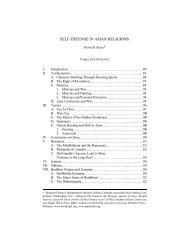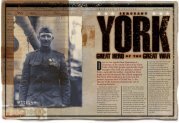You also want an ePaper? Increase the reach of your titles
YUMPU automatically turns print PDFs into web optimized ePapers that Google loves.
Ringside at D.C. v Heller<br />
from page 35<br />
implicit self-defense exception to the<br />
trigger lock law because banning selfdefense<br />
was the intent of the law.<br />
Gura pointed out that d.c. had so<br />
admitted, and the District of Columbia<br />
Court of Appeals had agreed, in the<br />
1977 case McIntosh v. Washington,<br />
where the nra had challenged d.c.’s<br />
then-new handgun and self-defense<br />
bans. Further, Gura explained, d.c.<br />
lawyers had formally acknowledged as<br />
an undisputed fact, when the trial court<br />
was hearing the Heller case, that the<br />
trigger lock law banned self-defense.<br />
Justice Stephen Breyer asked a<br />
lengthy question about whether, in light<br />
of the Second Amendment’s primary<br />
purpose of encouraging a citizen army,<br />
and in light of the statistics about<br />
handgun crime, the handgun ban is a<br />
“proportionate” law.<br />
Gura pointed to briefs from retired<br />
����������������<br />
generals and other officers (including<br />
nra Secretary Edward J. Land) that<br />
pointed out that the d.c. laws prevent<br />
District residents from acquiring civilian<br />
familiarity with firearms, and that<br />
research has shown that soldiers who<br />
are experienced with guns in civilian life<br />
make much better combat marksmen.<br />
Justice Breyer replied that d.c.<br />
residents can still use rifles at target<br />
ranges in Maryland or Virginia.<br />
Gura then pointed to the many<br />
federal court cases that recognized the<br />
militia utility of handguns.<br />
Justices Ginsberg and Souter propounded<br />
a series of challenging questions,<br />
while Justice Scalia stepped in to<br />
support Gura. Justice Kennedy returned<br />
to his “settler in the wilderness” imagery.<br />
Dellinger had reserved 10 minutes<br />
for rebuttal, and he used all the time<br />
in arguing for the reasonableness of<br />
the d.c. laws. Chief Justice Roberts<br />
expressed skepticism about a crime<br />
victim’s ability to remove a trigger lock<br />
and load a gun in the dark, in the few<br />
seconds after a criminal had broken<br />
into his or her home.<br />
d.c.’s law against carrying guns<br />
actually forbids a person who owns a legal<br />
handgun (a pre-1976 grandfathered one)<br />
from carrying the handgun from one<br />
room to another in his or her own<br />
home. Dellinger could only characterize<br />
the carry law as reasonable by<br />
misstating what it actually says.<br />
Although oral argument had been<br />
scheduled to take 75 minutes in total,<br />
overtime questions to all three of the<br />
lawyers had added an additional<br />
22 minutes—an unusual display of<br />
the Supreme Court’s keen interest in<br />
the subject.<br />
As I headed to the airport in the<br />
afternoon, my talkative cab driver asked<br />
what I had been doing in Washington.<br />
He was an immigrant from Eritrea,<br />
an east African nation that used to be<br />
part of Ethiopia. Before Eritrea won<br />
its independence, it was under the<br />
rule of the genocidal tyrant Mengistu,<br />
whom the cab driver described as an<br />
African Hitler. Yet the cabbie’s tribe, the<br />
Afars, had always been left alone by the<br />
government, he said, because everyone<br />
in the tribe had a rifle, and carried it<br />
wherever he went.<br />
The cab driver was disgusted with<br />
the d.c. law banning handguns and selfdefense<br />
in the home. He told me about<br />
his friend, an Ethiopian immigrant,<br />
who was a landlord. One day, the police<br />
raided a tenant’s apartment, suspecting<br />
the tenant was involved with drugs. The<br />
police also raided the landlord’s home,<br />
and found no drugs, but did find a gun<br />
that the landlord kept for self-defense.<br />
For a year and a half, the landlord<br />
was dragged through the d.c. courts<br />
until, finally, the prayers of his cab driver<br />
friend were answered: a kind-hearted<br />
judge put the landlord on probation,<br />
instead of sending him to jail.<br />
“The American Constitution is<br />
the greatest in the world,” the cabbie<br />
affirmed. “Every country should use it.<br />
The one thing that every American can<br />
give to his children and grandchildren<br />
is the American Constitution.”<br />
Two centuries separate James<br />
Madison from the Eritrean cab<br />
driver. Yet the two men are united<br />
in their passionate love of America’s<br />
constitutional liberty.<br />
After the recent oral arguments in the<br />
d.c. case, I am hopeful that the Supreme<br />
Court will fulfill the hopes of our revered<br />
Founders and of our newest patriotic<br />
citizens by affirming our individual<br />
Right to Keep and Bear Arms.




